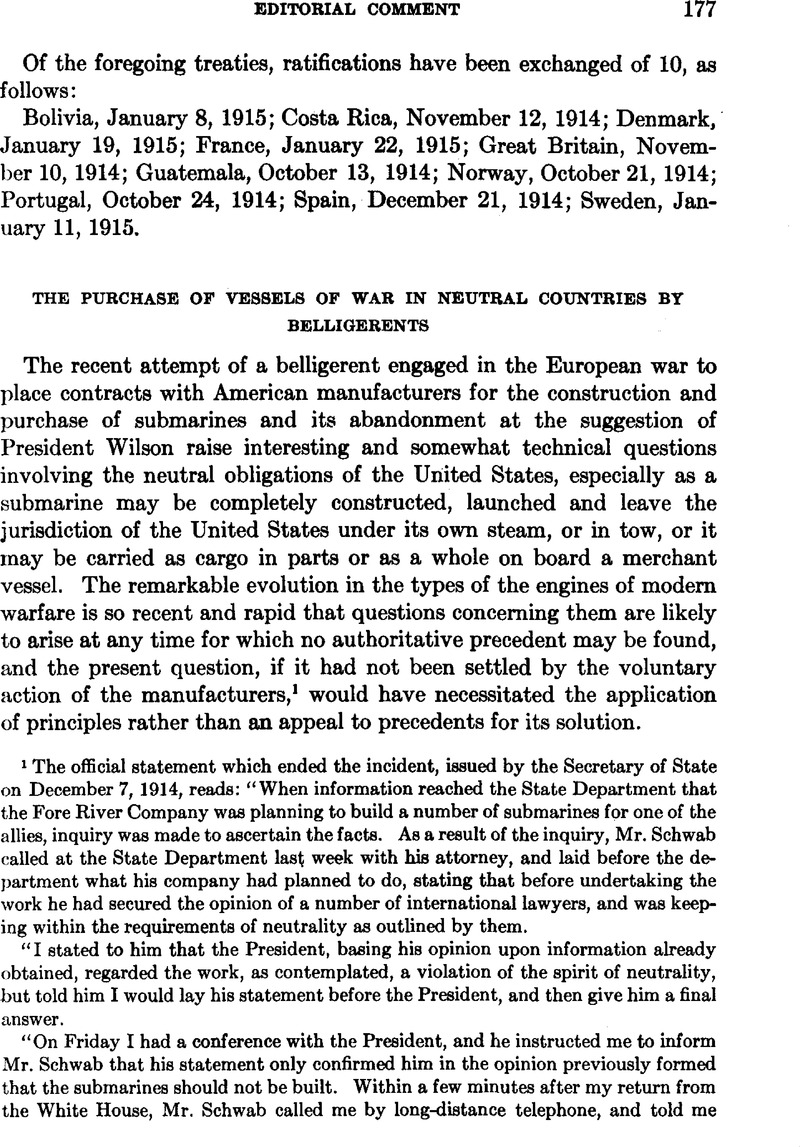No CrossRef data available.
Published online by Cambridge University Press: 04 May 2017

1 The official statement which ended the incident, issued by the Secretary of State on December 7, 1914, reads: “When information reached the State Department that the Fore River Company was planning to build a number of submarines for one of the allies, inquiry was made to ascertain the facts. As a result of the inquiry, Mr. Schwab called at the State Department last week with his attorney, and laid before the department what his company had planned to do, stating that before undertaking the work he had secured the opinion of a number of international lawyers, and was keeping within the requirements of neutrality as outlined by them.
“I stated to him that the President, basing his opinion upon information already obtained, regarded the work, as contemplated, a violation of the spirit of neutrality, but told him I would lay his statement before the President, and then give him a final answer.
“On Friday I had a conference with the President, and he instructed me to inform Mr. Schwab that his statement only confirmed him in the opinion previously formed that the submarines should not be built. Within a few minutes after my return from the White House, Mr. Schwab called me by long-distance telephone, and told me that he submitted to the President’s views of the subject, and that I could announce that his firm would not build submarines for any belligerent country for delivery during the war. This closes the submarine incident.” (Washington Post, Dec. 8, 1914, p. 3.)
2 Moore, International Law Digest, Vol. VII, p. 960.
3 Ibid., Vol. VII, p. 861. The sale to Russia during the Russo-Japanese War by the North German Lloyd and German Hamburg-American Steamship Companies of a number of merchant vessels adaptable to warlike purposes is not generally criticized on the ground that Germany allowed the sale by its subjects and delivery to one of the belligerents of vessels which were easily converted into warships, but, owing to its interest in the vessels, which practically formed a part of her auxiliary navy, the objection is made that Germany was a party to the sale, and thereby violated her duty as a neutral nation. Hershey, Essentials of International Public Law, sec. 462, note 6, and citations there given. This author erroneously states that the vessels were sold to Japan.
4 International Law, 6th ed., p. 606.
5 Moore, Digest of International Law, Vol. VII, pp. 890–891.
6 Ibid., p. 889.
7 United States Statutes at Large, Vol. 35, Part 1, p. 1090; R. S. 5283.
8 Page 563, note.
9 The Laurada (1900), 98 Fed. Rep. 983.
10 Moore, International Arbitrations, Vol. I, p. 550.
11 Ibid., p. 655. The words “due diligence” were defined by the Tribunal as being the amount of diligence which “ought to be exercised by neutral governments in exact proportion to the risks to which either of the belligerents may be exposed, from a failure to fulfil the obligations of neutrality on their part.” Ibid., p. 654.
12 Snow, Cases, note on pp. 437–438. Cf. Scott, Cases, 720.
13 For a collection of views of leading publicists on the rules, see Moore, Arbitrations, Vol. I, pp. 670–678.
14 Page 639.
15 Scott, The Hague Peace Conferences of 1899 and 1907, Vol. 2, p. 511.
16 Fenwick, The Neutrality Laws of the United States, p. 119.
17 International Law, 4th ed., p. 640.
18 International Law, 2d ed., Vol. 2, p. 405.
19 See quotations from international law writers in this comment, the Declaration of London, and the official lists of contraband issued by the Governments. See also Swan v. United States, 19 Court of Claims, 51, 62, holding that within the meaning of the Prize Act of 1864 the terms “vessel” and “ship” are synonymous.
20 British and Foreign State Papers, Vol. 60, 278, 289.
21 113 U. S. 747.
22 183 U. S. 424, at 438.
23 This word is interpreted by the statute (Sec. 30) to include any act towards or incidental to the construction of a ship.
24 Yarnberg v. Watson (1884), 4 Pac. 296.
25 Commonwealth v. Francis, Thach. Crim. Cas. 240.
26 Moore, Digest, Vol. VII, pp. 896, 897, 905. See to the same effect the following statement of Dana in his notes to Wheaton’s Elements of International Law (8th ed., 1866, p. 563): “No cases have arisen as to the combination of materials which, separated, cannot do acts of hostility, but, united, constitute a hostile instrumentality; for the intent covers all cases, and furnishes the test. It must be immaterial where the combination is to take place, whether here or elsewhere, if the acts done in our territory—whether acts of building, fitting, arming, or of procuring materials for these acts—be done as part of a plan by which a vessel is to be sent out with intent that she shall be employed to cruise.”